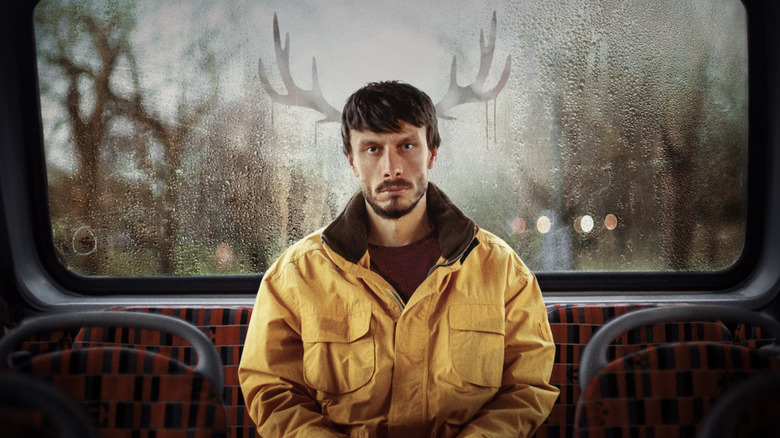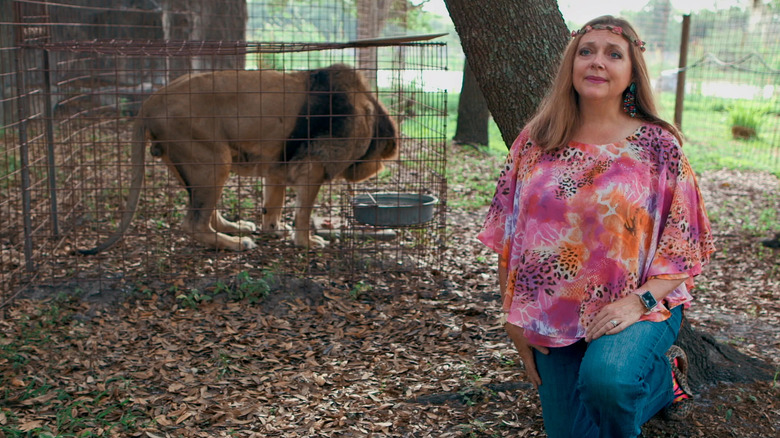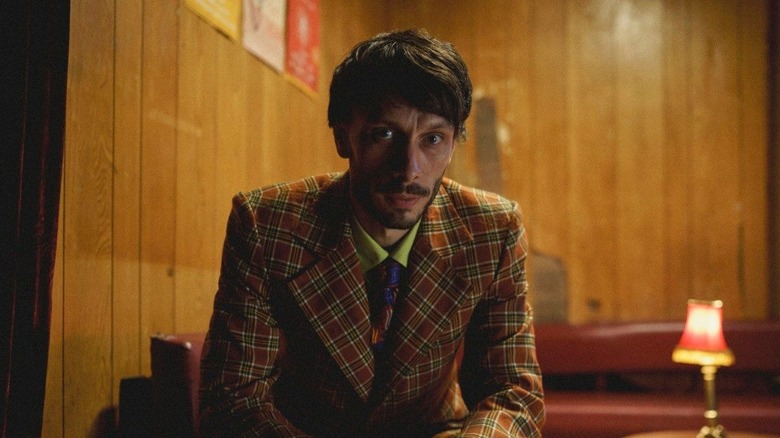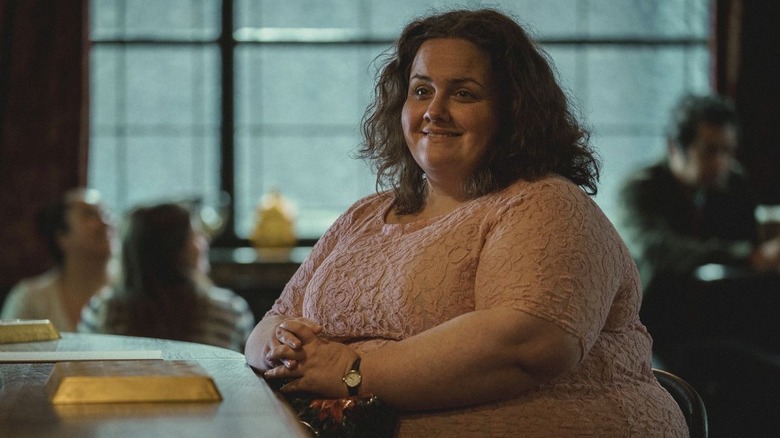Netflix's Best New Show Teaches Us A Hard Lesson About The Streamer's Worst Habits
Content warning: This article discusses topics that may be triggering to some readers, including stalking, grooming, and sexual assault.
"Baby Reindeer" is the latest Netflix phenomenon, the must-see limited series that people can't stop talking about. Starring Scottish comedian Richard Gadd and based on his award-winning play of the same name, "Baby Reindeer" is a dramatized look at real events Gadd endured when he was stalked by a woman he refers to as "Martha," and how his prior, unresolved history with sexual assault directly influenced how he responded to the situation. Given that Gadd is essentially reliving his trauma, "Baby Reindeer" differs from the majority of "based on true events" adaptations in that the person telling the story was actually there. There's no mystery to solve because the show's survivor is the one shaping the narrative.
But despite Gadd's tireless attempts to keep the identities of his abuser, his stalker, and his exes protected, online sleuths are treating it like a challenge and attempting to figure out who the people are in real life, which completely defeats the purpose of the series. "Baby Reindeer" is not some true crime whodunnit, it's a deeply complex and emotionally raw examination of one man's real-life pain. "Please don't speculate on who any of the real-life people could be. That's not the point of our show," Gadd posted on his Instagram story on April 22. I've seen some folks claim that Gadd "should have known better" and should have expected that people online would get to the bottom of things, which is a pretty ghastly way to view the situation. Not only is it victim blaming in its purest form, but it also insinuates that our society should bend to the whims of the lowest-common-denominator people.
But I can't say that I blame them for having this response when Netflix has been actively courting this sort of behavior for years.
The ethics of true crime
True crime has become an incredibly lucrative area of entertainment, a sentence that is pretty gross to type out, all things considered. True crime podcasts are worth millions, and Netflix has proven with documentary shows like "Making a Murderer" and "Tiger King," as well as dramatizations like "Dahmer – Monster: The Jeffrey Dahmer Story" that true crime is one of the fastest ways to keep subscriber eyeballs on screens, and (arguably more importantly) talking about the shows around the virtual watercooler of social media. Viewers have slowly developed parasocial relationships with the subjects of these stories, like the countless number of people who have been continually retraumatizing the family of Don Lewis, the missing first husband of "Tiger King" star Carole Baskin by claiming they've seen him alive.
And it certainly doesn't help when another Netflix hit, "Don't F*** With Cats: Hunting an Internet Killer," showcased how a group of amateur online sleuths were integral in bringing murderer Luka Magnotta to justice. Let me be explicitly clear: Magnotta being caught is a good thing, but this story has empowered many online to do the same with every unsolved mystery they come across, often without the proper know-how or understanding of the legal system. Instead of actually doing something to make the world a better, safer place, online harassment is dressed up as "activism." Netflix even discussed this sort of behavior in "Crime Scene: The Vanishing at the Cecil Hotel," where the musician Morbid, aka Pablo Vergara talked about being harassed for months after online sleuths falsely accused him of the murder of Elisa Lam. One would think folks would learn a lesson from that scenario and yet there are articles, TikToks, and Twitter threads (sorry, no one calls it "X") from folks "exposing" the identities of the real people referenced in "Baby Reindeer."
We don't get to decide how another person responds to abuse
Gadd first debuted "Baby Reindeer" at the 2019 Edinburgh Fringe Festival, and while Netflix has clearly given him one of the largest platforms one could have, he's still elected not to out the true identity of Martha or the man who groomed and assaulted him. There have been some online who have egregiously claimed that by not naming them, he's "clearly chasing fame," which is an incredibly vile accusation to lobby at a survivor. Gadd was abused and stalked, and his friends and loved ones were also harassed for months. Understandably, people watching his story unfold want to know that those who did him harm were held accountable ... but it's not up to anyone but Gadd to determine what that looks like.
Gadd shouldn't have to worry about whether or not strangers on the internet are going to suddenly dox his stalker, a woman he has very explicitly explained is mentally ill and just as much a victim failed by the system as he is, nor should he have to worry about whether or not any and every man he's ever worked with professionally is suddenly going to be accused by name as a groomer or a rapist. There are folks debating whether or not Gadd should have "done more" to protect their identities with the same fervor as those who demand he named them outright. This is not activism, and the worst part is that there's no winning.
Respect the boundaries of survivors
The events of "Baby Reindeer" are some seriously compelling stuff, but it's the way Gadd presents the story that elevates his real story into a must-watch series. There is an undercurrent of vulnerability that is truly unmatched for a series about a male victim, and his willingness to openly present himself as an "imperfect victim" is something that the majority of movies/shows based on a true story refuse to do. Gadd's character Donny — an avatar for himself — makes mistakes that often directly impact situations with his stalker and the man who abused him. This isn't an attempt to victim blame or paint him as "deserving" of what happened to him, but to showcase that these scenarios are far more complicated than the binary presentation of "good guy/bad guy" that entertainment often locks these sorts of stories into.
Even uglier, there are those claiming that not wanting to name those involved is somehow "supporting abuse" or "defending rapists" which, again, is a ghastly accusation to lobby at the survivor.
Gadd being in control of the narrative as the victim and survivor recounting events means that he's been allowed to set boundaries around what he's willing/unwilling to make public. And yet, rather than recognizing that this story is being presented this way by design, audiences are feeling entitled. These "online sleuths" are completely ignoring the boundaries a stalking and rape survivor has put in place because it doesn't satisfy their personal desires. I've been very vocal over the years regarding my own history as a survivor, and the fact I've never publicly named any of the men who raped me makes a lot of people — exclusively strangers — very upset. And it's then that I remind myself that people who care more about me naming my rapists than whether or not I'm safe, surviving, and healing, don't care about survivors — they care about using survivors as a vehicle to play judge, jury, and executioner for themselves.



